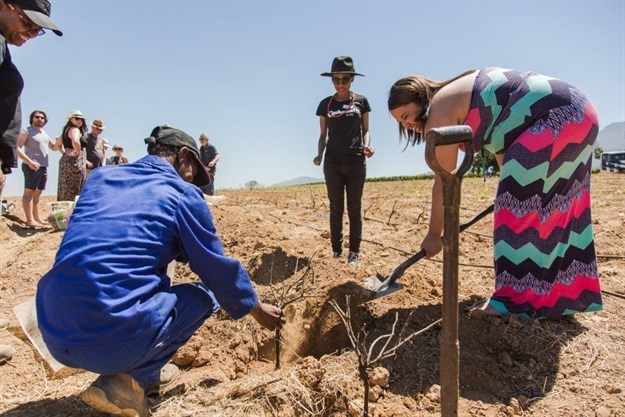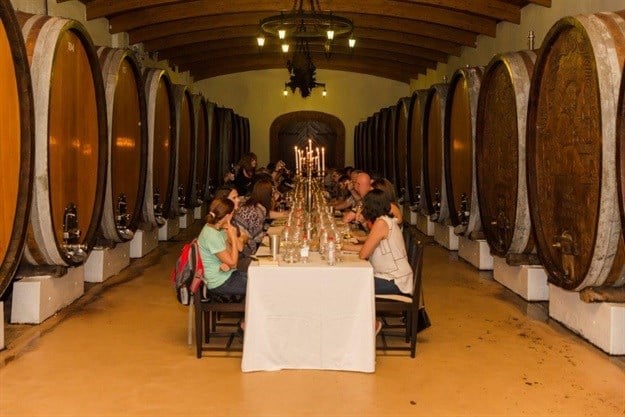
Top stories






More news













The planting was guided by Nederburg’s viticulturist, Bennie Liebenberg; farm manager, Bertie Faure, who retires at the end of the year after 28 years at Nederburg; as well as assistant farm manager, Zelda Claasen. Pattre Franken will take over from Faure as farm manager in January 2017.

Guests got their hands dirty and helped plant the cultivar, Chambourcin, on a block that’s been resting for three years to improve the decomposed granite soil. Cabernet Sauvignon was previously grown here.
“Considered a French-American hybrid grape, Chambourcin is noted for its distinctive dark colour and spicy, black cherry and plum flavours with an abundance of herbal characters,” says Liebenberg, who joined Nederburg as viticulturist in late 2015.
Liebenberg added that although still relatively unknown in South Africa, Chambourcin is widely planted in parts of the US and Australia, particularly for its ability to withstand extreme weather conditions as well as pests and diseases. “Climate change poses a huge challenge for the South African winemaking industry. By introducing new and unusual varieties, we are essentially experimenting and planning for the future, creating additional building blocks for innovation. Given Nederburg’s heritage that spans 225 years, it is our responsibility to ensure the future or our winery.
“In fact, Nederburg has been experimenting with Mediterranean varietals well-suited to changing climatic conditions for more than a decade. For example, both Tempranillo and Graciano were established at our Simondium farm in 2004, and we planted a small mixed block of Carignan and Grenache on the farm in Paarl in 2008. There are other instances as well. It was access to the Italian varietals such as Sangiovese, Nebbiolo and Barbera that had allowed previous cellar-master Razvan Macici and his team to develop the Italian blend that was the first of its kind to be launched locally, and that is now housed in the Ingenuity connoisseur collection of experimental wines.
“We are now taking it a step further and planting varieties such as Chambourcin, Vidal blanc and Seyval blanc. We’re doing so not only to battle climate change, but also to progress towards the elimination of pest and disease control in the vineyards, thereby addressing these challenges in a more environmentally sustainable manner. However, until we have determined the quality of the fruit and its flavour profile, it will not be possible to say whether the grapes will be destined for a varietal wine or a blend.

“Part of our role as viticulturists is to explore the potential of what can be regarded in South Africa as the more exotic cultivars to give Nederburg the necessary resources to expand its repertoire in line with market trends. By experimenting and exercising with lesser known varietals we open ourselves up to new and creative avenues of winemaking. Sometimes just the slightest nuance of flavour contributed by an unusual cultivar can add a new dimension to a wine,” he explains.
After the vine planting, guests returned to the cellar for a tasting of Nederburg’s four wines awarded five-star ratings in the 2017 edition of Platter’s By Diners Club South African Wine Guide. The authoritative guide named Nederburg its 2017 Winery of the Year.
Older vintages of the same selection of wines, well-suited to ageing, were also offered, with the tasting led by cellar-master Andrea Freeborough and Razvan Macici, her predecessor, who is now chief winemaker for Distell. Included in the tasting lineup was the 2013 vintage of Nederburg’s Private Bin Cabernet Sauvignon, which recently earned the 2016 International Wine & Spirit Competition (IWSC) trophy for the best Cabernet Sauvignon of the show (while at the same competition Nederburg itself was awarded the title of South African Wine Producer of the Year).
The event concluded with a lunch on the veranda of the historic Nederburg manor house. Featuring traditional dishes interpreted in a contemporary manner, the meal was paired with selected wines from Nederburg’s exclusive Heritage Heroes collection, including The Anchorman Chenin Blanc 2015. A wooded Chenin blanc, this wine pays tribute to Phillipus Wolvaart, the man who started it all at Nederburg and had the vision and courage to tame a wilderness and grow great wine.